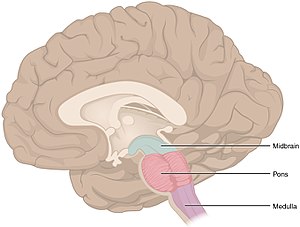
Back نخاع مستطيل Arabic Оҙонса мейе Bashkir Прадаўгаваты мозг Byelorussian Продълговат мозък Bulgarian মেডুলা অবলংগাটা Bengali/Bangla Produžena moždina BS Bulb raquidi Catalan لاکێشەمۆخ CKB Prodloužená mícha Czech Medulla oblongata Danish
This article needs additional citations for verification. (October 2010) |
| Medulla oblongata | |
|---|---|
 Medulla oblongata part of the brain stem (purple colored) | |
 Section of the medulla oblongata at about the middle of the olivary body | |
| Details | |
| Part of | Brain stem |
| Identifiers | |
| Latin | medulla oblongata, myelencephalon |
| MeSH | D008526 |
| NeuroNames | 698 |
| NeuroLex ID | birnlex_957 |
| TA98 | A14.1.03.003 |
| TA2 | 5983 |
| FMA | 62004 |
| Anatomical terms of neuroanatomy | |
The medulla oblongata or simply medulla is a long stem-like structure which makes up the lower part of the brainstem.[1] It is anterior and partially inferior to the cerebellum. It is a cone-shaped neuronal mass responsible for autonomic (involuntary) functions, ranging from vomiting to sneezing.[2] The medulla contains the cardiovascular center, the respiratory center, vomiting and vasomotor centers, responsible for the autonomic functions of breathing, heart rate and blood pressure as well as the sleep–wake cycle.[2] "Medulla" is from Latin, ‘pith or marrow’. And "oblongata" is from Latin, ‘lengthened or longish or elongated'.
During embryonic development, the medulla oblongata develops from the myelencephalon. The myelencephalon is a secondary brain vesicle which forms during the maturation of the rhombencephalon, also referred to as the hindbrain.
The bulb is an archaic term for the medulla oblongata.[1] In modern clinical usage, the word bulbar (as in bulbar palsy) is retained for terms that relate to the medulla oblongata, particularly in reference to medical conditions. The word bulbar can refer to the nerves and tracts connected to the medulla such as the corticobulbar tract, and also by association to those muscles innervated, including those of the tongue, pharynx and larynx.
- ^ a b Webb, Wanda G. (2017-01-01), Webb, Wanda G. (ed.), "2 - Organization of the Nervous System I", Neurology for the Speech-Language Pathologist (Sixth Edition), Mosby, pp. 13–43, doi:10.1016/b978-0-323-10027-4.00002-6, ISBN 978-0-323-10027-4, retrieved 2020-11-15
- ^ a b Waldman, Steven D. (2009-01-01), Waldman, Steven D. (ed.), "CHAPTER 120 - The Medulla Oblongata", Pain Review, Philadelphia: W.B. Saunders, p. 208, doi:10.1016/b978-1-4160-5893-9.00120-9, ISBN 978-1-4160-5893-9, retrieved 2020-11-15